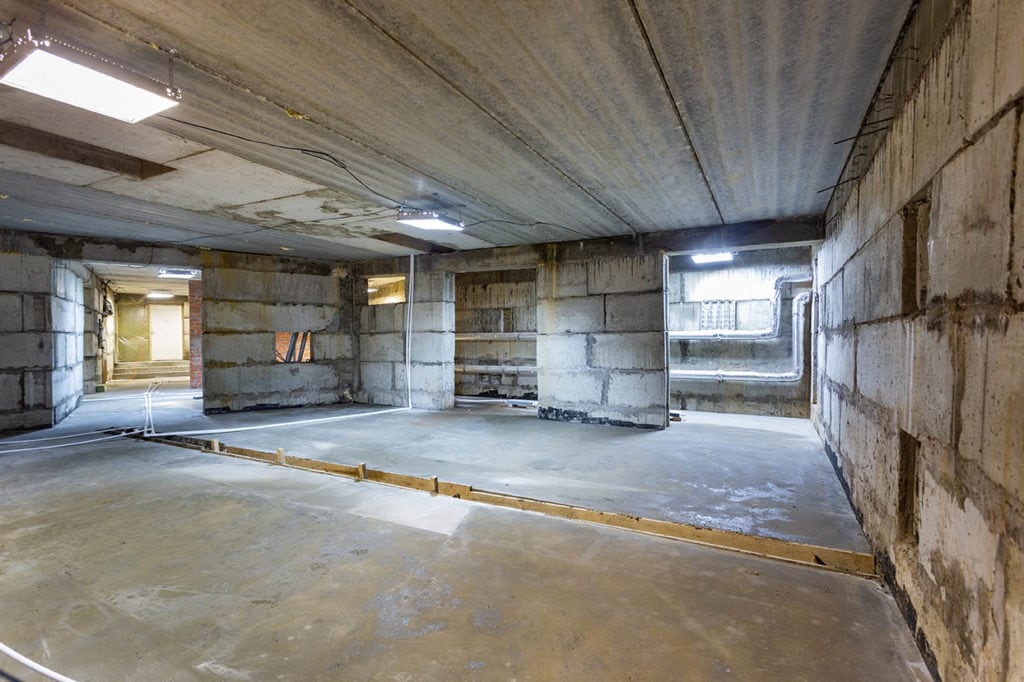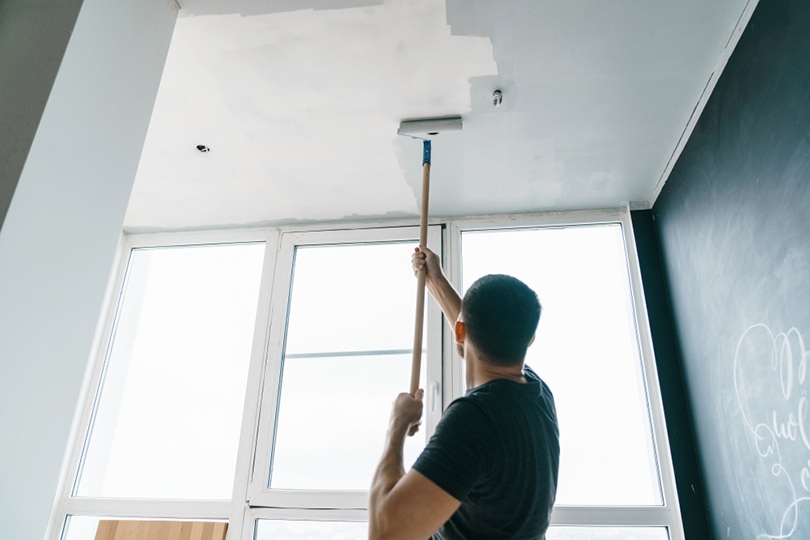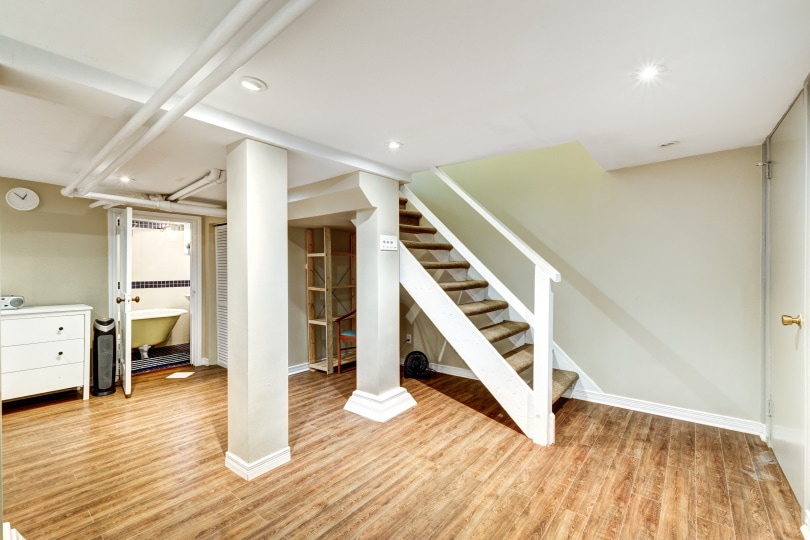Do I Need a Permit to Finish My Basement? Facts & FAQ
-
Visnja Radosavljevic
- Last updated:

There are various reasons why you might want to finish your basement. Maybe you’re looking to increase the square footage of your home, or you’re looking for some extra space to gain a bonus room or an additional suite. When it comes to basement finishing, the possibilities are endless, so it all comes down to your needs and wishes.
However, turning your basement into a functional space can be a complex process, especially since the majority of states in the US require a permit before you start the construction work. If you’d like to know more about it and why you might need a permit to finish your basement, check out the rest of our article.
Should You Get a Permit to Finish Your Basement?
When it comes to permits, they vary from city to city as there are no state or federal standards that apply to every area of the US. The only way to be sure is to check the requirements in your area.
If you’re just looking to change carpets and replace furniture, there’s no need for a permit. However, most towns will require a permit for construction, electrical, HVAC and plumbing work your basement needs. Typically, things such as installing drywall or any type of structural work need a permit before the project can begin.
States like New York, Pennsylvania, Michigan, Connecticut, Georgia, and Wisconsin require you to have a permit for any work you plan on doing to your home, including finishing your basement.

Finishing Projects That Require a Permit
Some finishing projects require you to have a permit as they will affect the structure of your home.
- Installing drywalls
- Installing or changing windows
- Plumbing and electrical work
- Any changes that will alter the current structure of your home
Again, the actual need for a permit will vary in every municipality, so you should discuss details with your local building department.
Finishing Projects That Don’t Require a Permit
There are also finishing decorative projects, which won’t change any of the structural plans you currently have in your home. Such projects usually don’t require a permit. Here’s a list of all the changes you can make in your basement without needing to worry about obtaining a permit to finish them:
- Installing floors or carpets
- Painting walls
- Installing wallpaper
- Minor electrical repairs
- Replacing finishes

Is Finishing Your Basement Without a Permit Illegal?
Although finishing your basement without a permit is not illegal, there can be consequences if your municipality typically requires a permit for such work. It’s always better to be safe than sorry, and the process of obtaining a permit is not too complex.
You can apply for one in your local municipal government office, and your home will probably need an inspection before the work begins. Without a permit, all the hard work you’ve put into the project could be in vain if you don’t finish the project according to the building rules in your area.
What Happens If You Finish Your Basement Without a Permit?
You could encounter various problems if you finish your basement without a permit. Although the possible penalties are not severe, some could impact all the work you’ve done, and they could result in fines and more monetary losses.
Below is a list of all possible issues you can face when you finish your basement without obtaining a permit.

Fines
One of the most common issues you’ll have to face if you finish your basement without a permit is paying fines. Your municipality will determine the final amount based on the work that you have already completed.
In some areas of the US, first-time offenders get a chance to get a retroactive permit, so it all depends on where you live. However, these permits are much harder to obtain than regular permits. They could also ask you to remove all the work you’ve done up to this point which can be frustrating and time-consuming.
You’ll need detailed plans of the basement and all the work that has been done, along with documentation from plumbers, contractors, electricians, and engineers stating that you did everything according to building codes in your area.
Tax Increase
If you finish your basement without a permit, you might need to pay taxes, resulting in a huge amount after the work is done. The longer you go without a permit, the more money you’ll have to spend on additional taxes, which can be a huge issue.

Issues Selling the Home
Most buyers are looking to purchase homes with all the required documentation and permits before buying the house. That’s because if there’s no permit and they purchase the property, they’ll be the ones who’ll have to pay fines in the end.
Decreased Home Value
Even if you manage to sell your home without having permits for finishing your basement, the property’s overall value will drastically decrease. Potential buyers might need to pay for fines and safety issues that could happen as the work might not be up to the needed code.
Removal of Work Already Done
In many municipalities, the building rules require you to get your finished basement into its previous state if you’ve done all the work without a permit. That means you’ll be forced to throw all your hard work down the drain and get rid of everything you’ve built so far.
Changes to the basement
When an inspector comes to your home and notices all the basement changes done without a permit, they can require you to make changes until the space matches all the regulations in your municipality. That means you might need to change plumbing and wiring or remove the fixtures you’ve installed. You’ll likely break your original budget or might be unable to cover all the costs for the changes.

Issues With Insurance
If you finish a basement without getting a permit, if something happens to your home, your insurance won’t cover that area of the property. Even if you spend thousands of dollars on your basement, you won’t be able to get replacement costs as that space isn’t included in the insurance policy.
The insurance company could also decline your insurance claims, as the property is not in its original state. Another thing that could happen is that your insurance company raises your rates to cover the basement as it didn’t have a permit.
Mortgage Refinancing
When you finish a basement without permits, you could face issues applying for a mortgage as the bank might not grant the total amount because of it. Also, when purchasing a home with a basement without permits, the bank could demand you to pay the entire loan as such things have safety and financial risks for the bank.

Your House May Be Condemned
Although this is not common, if your home fails to pass all the necessary inspections, your house could end up condemned. When you finish your basement without a permit and without following all building codes and regulations, you could experience serious damage.
Issues such as infrastructure failure or severe cases of black mold could lead to the law condemning your home. Some municipalities use this as a threat so that you’ll obtain all necessary permits, but be aware that this could still possibly happen.
Final Thoughts
Before starting any finishing work on your basement, collect all the required information about permits in your municipality. It’s better to spend a bit of time and money on obtaining the permit than worrying about all the possible issues you could experience if you finish the work without the permit.
- “How the Permit Process Works When Finishing a Basement”
- “Finishing Basement Without Permit [Risks and Consequences]”
- “Does Finishing a Basement Require a Permit?”
- “Finishing Basement Without Permit [Is It Really Illegal?]”
- “What Happens if I Finish My Basement Without a Permit”
- “Do I Need a Permit for Basement Finishing?”
Featured Image Credit: Chokniti-Studio, Shutterstock
Contents
